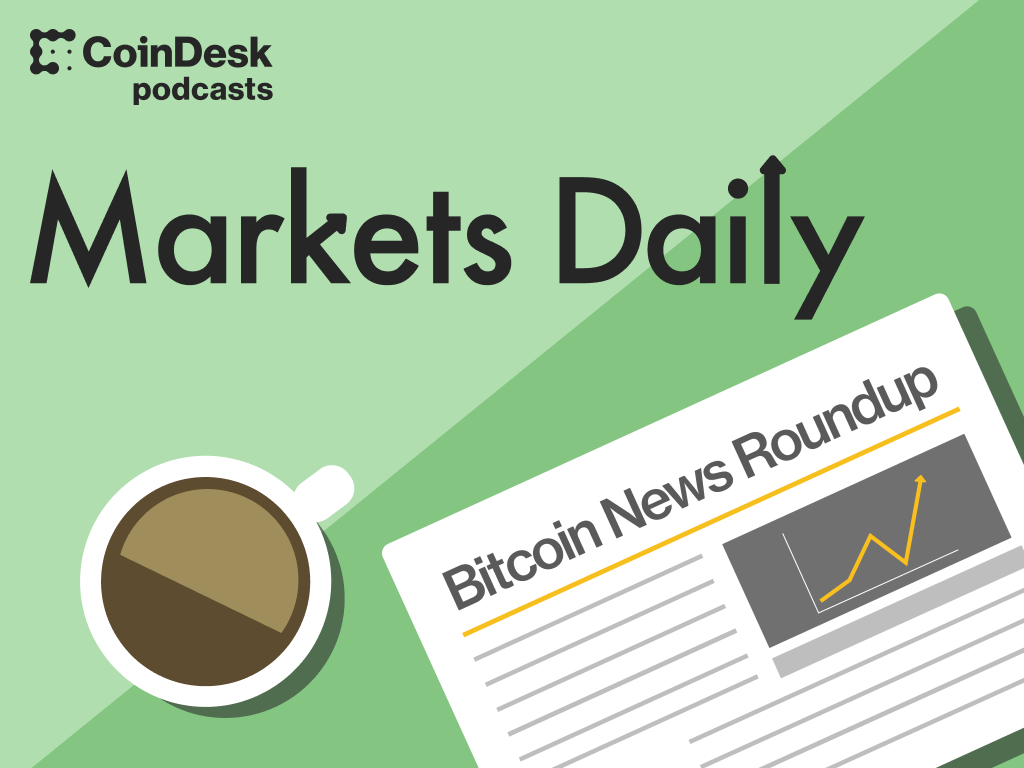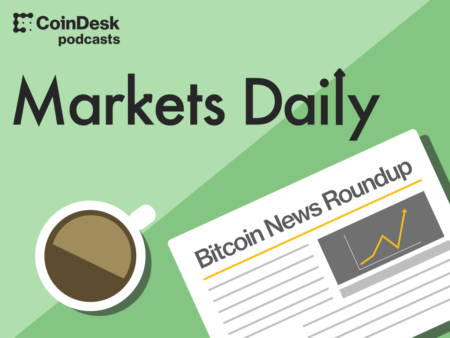To get the show every day, follow the podcast here.
Today’s “Markets Daily” begins with a minute of markets updates followed by an more macro-focused interview with host Jennifer Sanasie and Ben Emons, senior portfolio strategist at NewEdge Wealth on his outlook for the U.S. economy during this election year.
This episode was hosted by Jennifer Sanasie. “Markets Daily” is executive produced by Jared Schwartz and produced and edited by Eleanor Pahl, alongside Senior Booking Producer Melissa Montañez. All original music by Doc Blust and Colin Mealey.
Audio Transcript: This transcript has not been edited and may contain errors.
JENNIFER SANASIE:
According to CoinDesk Indices, at 8 a.m. Eastern time, bitcoin was trading down slightly, dropping below the $40k mark to $39,867. Ether fell over 1%, sitting at $2,210. Notably, the CoinDesk Indices ether trend indicator dropped from uptrend to neutral yesterday, for the first time since October 24th. According to Amberdata, options tied to ether show bias for price weakness over next three months. Today’s ‘Mover’ in the CoinDesk Market Index is Slacoin, ticker SC, down 30% on the day. And in traditional markets, the NASDAQ was up 0.3% yesterday while the S&P 500 rose slightly – notching a fourth straight day closing at a record high. Lastly, in commodities, the Brent crude oil benchmark rose, trading at 80 dollars and 65 cents a barrel. Data shows U.S. crude stockpiles fell more than expected yesterday to a five-month low as winter weather disrupted refinery operations. Meanwhile, gold was trading at 2015 dollars an ounce.
For more on the markets action, let’s bring in Senior Portfolio Manager at NewEdge Wealth Ben Emons. Welcome to the show, Ben. We’re sitting here in January, how are you thinking about allocating a portfolio?
BEN EMONS:
Yeah, it looks to be an uncertain year, I think that’s what this month is showing, you know, we have good economic data and bad economic data. And that’s sort of reflected in the markets. I think, above that you have also the uncertainties that are developing in the Middle East and then developing here domestically, and the election is getting a bit underway when it starts to affect markets. So I’m of the view that you should be a bit offense and defense. You know, we like financials, banks, we like to be in emerging markets, we like to look at technology, this is still a really good sector to be in. But we’re a little bit careful on the small caps. I remember last quarter was such an incredible rally in that sector, with all this belief of soft landing and those things, not that we don’t think that there won’t be a soft landing. In fact, we believe there’s no recession whatsoever. But it’s the small caps, I think are highly sensitive to interest rates, what happens, and that’s I think unfolding in space is still going to be higher. So I think you have to have a more portfolio that’s driven by companies that deliver high growth, even though they’re trading at high multiples currently, against also uncertainty that you have to keep in mind. So other things like bitcoin or gold play a role too, I think, so there’s a bit of a mixture of all of those.
JENNIFER SANASIE:
From a geopolitical perspective. What are you watching closely? What do you think will most deeply affect markets, let’s say in the first quarter?
BEN EMONS:
Well, one it will be, as always, the Federal Reserve because all the hype and attention to the March meeting about whether they will have enough cut rates. That’s sort of what is obviously the narrative dominance. But I think it dominates the narrative so much that it’s actually taking away attention from things that are happening in the Red Sea, which are ongoing attacks there now. This, it seems to be somewhat broadening in the region, where there were no developments with Pakistan and Iran overnight that got very little attention. But yet, it’s actually another step of escalation. Then now what’s going on in China and they’re trying to stabilize the economy, but it’s isn’t really working as well as they would have hoped for a lot of thoughts about China, would we re accelerate with the economy that doesn’t seem likely, in that story is, again, the trade tensions that are coming back to the attention of markets, you know, if Trump becomes the next president, it will be a more intimate intensified trade war. And that’s something that will be discounted ahead of time. Lastly, is more own domestic economy have a lot of stimulus in the economy and the economy seems to be holding in. So will inflation actually this quarter see some sort of a bottoming process, yes or no, it will be very critical. A lot of people believe we’re way past and we’re only going to go down with inflation, but that could change if the economy holds up this way.
JENNIFER SANASIE:
You said something interesting a little earlier on is that you don’t think a recession is coming. I know VanEck put out a report late last year that said that they do expect a recession. Analysts are divided on this, why don’t you expect a recession to hit the U.S. this year?
BEN EMONS:
Well, it really comes down to the fiscal stimulus that has been on an ongoing basis pushed into the economy. You know, there’s some real time data on this, basically, on a daily basis, we’re spending anywhere from $80 to $150 million of fiscal stimulus just on infrastructure projects, to the chips act through the infrastructure, inflation reduction act. It’s just ongoing spending, and it’s across the country. And this is everybody’s having a productivity effect. And so in that, and you can kind of tell from weekly jobless claims, as one of the best indicators of where the labor market currently is, this is no change in any deterioration there. In other words, we don’t see any significant rise in jobless claims of anything, they’re declining again. So I think the economy really would have to confront a different political environment where spending is dramatically cut. And where as high rates are still with us at this moment, and really start to affect the economy more than it has done so far. And that’s just not happening. I think, in this political year, there’s not going to be much change in this fiscal spending pattern that we’re seeing, because neither the Democrats nor Republicans wants to make any kind of change. So I think the economy holds up, no matter what happens to China or what happens elsewhere. The U.S. economy is very driven currently, by fiscal spending.
JENNIFER SANASIE:
You also mentioned the upcoming elections. I know you wrote in a recent newsletter, about ETF baskets balancing out during those elections. Talk to us a little bit more about what you mean there.
BEN EMONS:
Yeah, back in 2016. And also 2020, people were trying to trade the presidential election through a basket of stocks and was really focused on a new president comes in with a big agenda. Because what Trump did in 2016, with deregulation, infrastructure spending and tax cuts, and Biden came in with much more of like a, you know, a green agenda, if you will, and other infrastructure items, and the certain particular sectors in the in the stock market that start to anticipate that, that you know, what could happen on the presidency. But I was looking at this saying, it’s probably a little different this time, you know, because both of both cases that has been in markets now for some time, it’s really clear what Trump will do when he comes into into office, we’re probably people were trying to figure out how much is the universal tariff that he proposes, which he can do through executive order, how will that really impact the economy? Probably not good. But there will be some companies and sectors who could benefit from this because all the tariffs will raise prices, and those companies will make more profits. You could think of anything that is related to technology, or electronics or other types of items, those companies will probably make more money, on the other hand, it’s not a binary outcome. So it’s not guaranteed Trump will win. So if Biden does win, probably a lot of the spending and proceed will continue. And how much will really change as in 2025 with the debt ceiling, what will then happen? So if I summarize, as I say, I’d rather just play more like a thematic idea of like all best is in you know, you have certain parts of the market like banks that could benefit from an environment where rates are more stabilized. And there’s so much more liquidity and more attention to bank regulation. And on the other hand, you want to not forget about technology, because that’s a really important driver of markets. And there’s not much of it, material change with government regulation, rather, these companies are generating significant growth and earnings. So that’s something to stay in. And I think if you do sectors like that, you kind of play this election year till we actually get the outcome and then we know what’s going to happen.
JENNIFER SANASIE:
And it’s not often these days that I chat to someone and we don’t bring up that spot bitcoin ETF approval in the United States. So I got to ask you, what’s your outlook for bitcoin after the spot bitcoin ETF approval?
BEN EMONS:
While it should be bullish, because, you know, if you’re getting more of these products online, all of them have to accumulate bitcoin in order to run the fund. By that there will be some exposure and futures but again, it’s all reflecting bitcoin. So I would only expect the price of bitcoin over time to go up. People obviously look at the limit of how many Bitcoins are outstanding, so we’re going to hit that limit I don’t know when exactly but at some point this year perhaps if more and more money comes into the asset class but there’s one thing that people are looking at now is that it used to be maybe you and me doing crypto trades and playing this on an on an exchange that the actual physical bitcoin but now it institutions will come in and start buying bitcoin ETF, even in our space and wealth management, people will look at bitcoin ETFs as a diversification, and as all that money comes into those funds, they may put that in treasury bills temporarily, but they’re going to start accumulating bitcoin in order to have, representative of the assets. Right. So, and obviously, you get other crypto too, that will likely, probably at some point a tether or ether ETF as well at some point. So I do think that it’s a bullish outcome for bitcoin, really because of institutional money coming in. And that itself leads to more accumulation of bitcoin, which is ultimately a scarce asset.
JENNIFER SANASIE:
And thanks so much for joining “Markets Daily” today.
BEN EMONS:
You’re welcome, Jenn. Thank you for having us.
JENNIFER SANASIE:
That was senior portfolio manager at NewEdge Wealth Ben Emons. Thanks for tuning in.
Read the full article here









